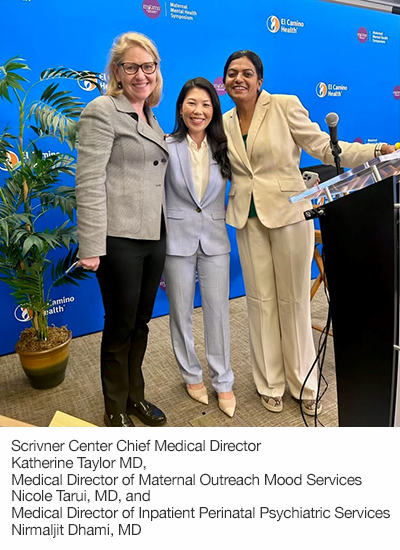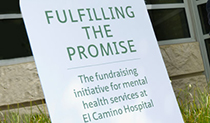
International Audience Attends 7th Annual Maternal Mental Health Symposium

More than 1,300 people from 22 countries and 40 states across the United States registered to attend. The day started with a welcome from El Camino Health CEO Dan Woods, who thanked the Keller family for sponsoring the educational program, which was accessible to people around the world for free. Dr. Nirmaljit Dhami, the Scrivner Center’s medical director of inpatient perinatal psychiatry services, reminded the audience that prenatal and postpartum depression and anxiety are the most common side effect of pregnancy. Still, too many women are not screened, diagnosed or treated. “Today’s theme,” she said, “is hope through advocacy and community engagement.”
Maria Muzik, MD, Professor of Psychiatry and Obstetrics & Gynecology at University of Michigan- Michigan Medicine in Ann Arbor, described how infants’ social and emotional wellbeing is shaped by the quality of their early relationships with their caregivers. Any disruptions to the creation of safe, secure, nurturing relationships, including untreated or undertreated perinatal psychiatric illness, may be detrimental to the infant’s physical and mental health with potentially multi-generational impact. She described how to integrate perinatal and infant mental health into the standard of clinical care.
Dr. Nicole Tarui, the Scrivner Center’s medical director of maternal outreach mood services (MOMS), led a panel discussion on the intersection of mental health and infant feeding. “Many studies demonstrate the benefits of breastfeeding for infants. The mental health impacts of breastfeeding on moms are less well studied,” she noted. The panelists agreed that parents need complete information so they can set realistic expectations and make decisions.
Joy Burkhard, founder and executive director of the Policy Center for Maternal Mental Health, presented the Federal Maternal Mental Health Task Force’s latest policy recommendations. These include a nonpunitive response when a woman seeks care; long-term federal funding so states can set up programs to provide access to psychiatric consultations; monitoring payment and reimbursement to ensure care is being delivered per recommendations and guidelines; and the establishment of maternity care clinics that provide evidence-based mother-baby care in areas of the country that have become maternity care deserts.
For many, the highlight of the day was the peer panel of moms and one dad who shared insights from their lived experiences. All expressed gratitude for the MOMS program, particularly the compassionate, specialized therapy with their babies, and communal support that helped them feel less alone. They advocated for more screening, more resources and better education for expectant parents. The panel was facilitated by Brianne Baker, LMFT, the Scrivner Center’s adult outpatient manager.
During her presentation, Joy Burkhard noted that 20% of perinatal women have a maternal mental health condition; fewer than 20% are screened; fewer than 20% of those diagnosed receive treatment; and roughly 20% of maternal deaths are due to suicide. El Camino Health launched MOMS, an intensive outpatient program, in 2008 to provide care to this traditionally overlooked population. Today, Dr. Dhami says, El Camino Health “has the most diverse and most comprehensive range of services in the country in reproductive psychiatry.” This includes universal screening for labor and delivery patients, a partial hospitalization day program, an inpatient perinatal psychiatry unit that is the only one of its kind on the West Coast and one of only three in the nation, and counseling for parents with a newborn in the neonatal intensive care unit. Gifts to El Camino Health Foundation have been critical to the launch and expansion of these services. Through programs like the MOMS Symposium, donors continue to provide hope through expert, compassionate psychiatric care, advocacy and community engagement.



